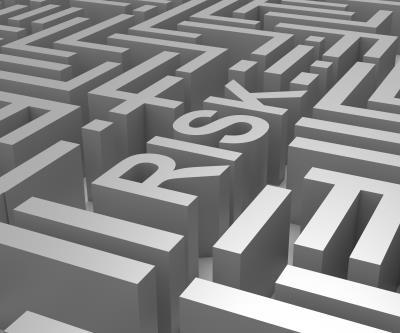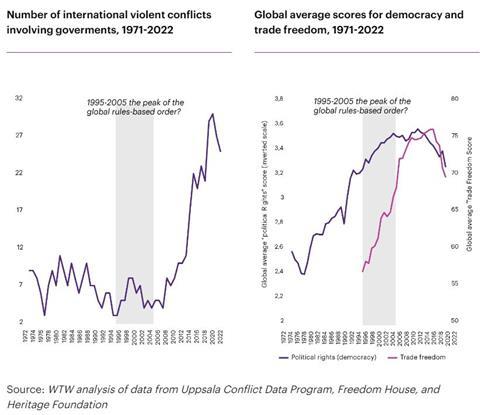A political risk insurance report from the broker highlights the decline of consensus on the liberal international order, summarising it as at best, ‘lukewarm’.

Political Risk is on the rise, warns a broker report from WTW, with bilateral investment treaties under strain in a multipolar world.
If the order is indeed in decline, will these changes – from the adoption of the rule of law to trade openness to the protection of intellectual property rights – be reversed? That is the key question addressed in the first half of 2024 edition of WTW’s ‘Political Risk Index’.
The analyses patterns in some of the world’s most vulnerable countries, looking at 40 emerging market countries.
The paper, conducted with Oxford Analytica, finds the overall attitude ‘lukewarm’, partly because the order’s institutions are out of sync with the geopolitical and economic shifts of recent years.
“Whatever one’s views on the so-called ‘rules-based international order’ or ‘liberal international order,’ it appears to be on its way out,” said Sam Wilkin, WTW’s director of political risk analytics.
“Macro indicators suggest that the order’s key principles, from international peace to free trade to electoral democracy, are in decline globally,” he continued.
The rules-based order was not based solely in international treaties or indeed the headquarters of multilateral organisations such as the World Trade Organization or International Monetary Fund, he explained.
“Rather, in large part, the order was embedded in the political, legal and regulatory choices of countries worldwide, in many cases via substantial institutional changes, such as democratisation,” Wilkin said.
The importance of bilateral investment treaties, vital for foreign direct investment between counterparties and core to political risk insurance, were highlighted in the report.
For instance, there were more than 1,100 bilateral investment treaties in force worldwide at the late-90s peak, WTW noted.
In 2020, for the first time, the number of bilateral investment treaties terminated exceeded the number of new treaties coming into force, the report highlighted.
By 2022, the ratio of treaties terminated to new treaties was nearly five to one, WTW observed.
The charts below provide further evidence of the weakening of the international order since its highpoint of the 1990s.
40 countries in focus

Chile, Taiwan and Ukraine are examples of strong supporters of the status quo, actively supporting the order, and making little effort to reform it, WTW observed.
Colombia, Cote D’Ivoire, Ghana, Kenya, Nigeria and Zambia were described as “committed reformers”, showing active support, but seeking reform.
Argentina, Kazakhstan, Philippines and Vietnam were termed “friendly opportunists”, sometimes supporting the order, but making little effort to reform it.
Egypt, Iraq, Jordan, Lebanon and Pakistan were described as “troubled dependents”, sometimes showing support, but this position is contested.
The “friendly critics”, characterised as sometimes supportive and seeking reform, were listed as Mexico, Morocco, Senegal and Tunisia.
WTW described Angola, Bangladesh, Ecuador and Peru as “the troubled democracies”, sometimes supportive of the order.
Regional powers were listed as another category, sometimes lending support, sometimes seeking to reform, with examples cited as Ethiopia, Saudi Arabia and Turkey.
Brazil, China, India and South Africa make up “the rising new order”, WTW said, sometimes supportive but “strongly seeking to reform” the system.
Those on the sidelines with no active position meanwhile include Cameroon, Indonesia, Mozambique, Thailand and Uzbekistan.
And at the end of the spectrum, Iran and Russia, as well as Cuba and North Korea, are the “opponents actively opposing the system”.










No comments yet